Charles E W Bean, Diaries, AWM38 3DRL 606/255/1 - 1916 - 1937 - Part 4
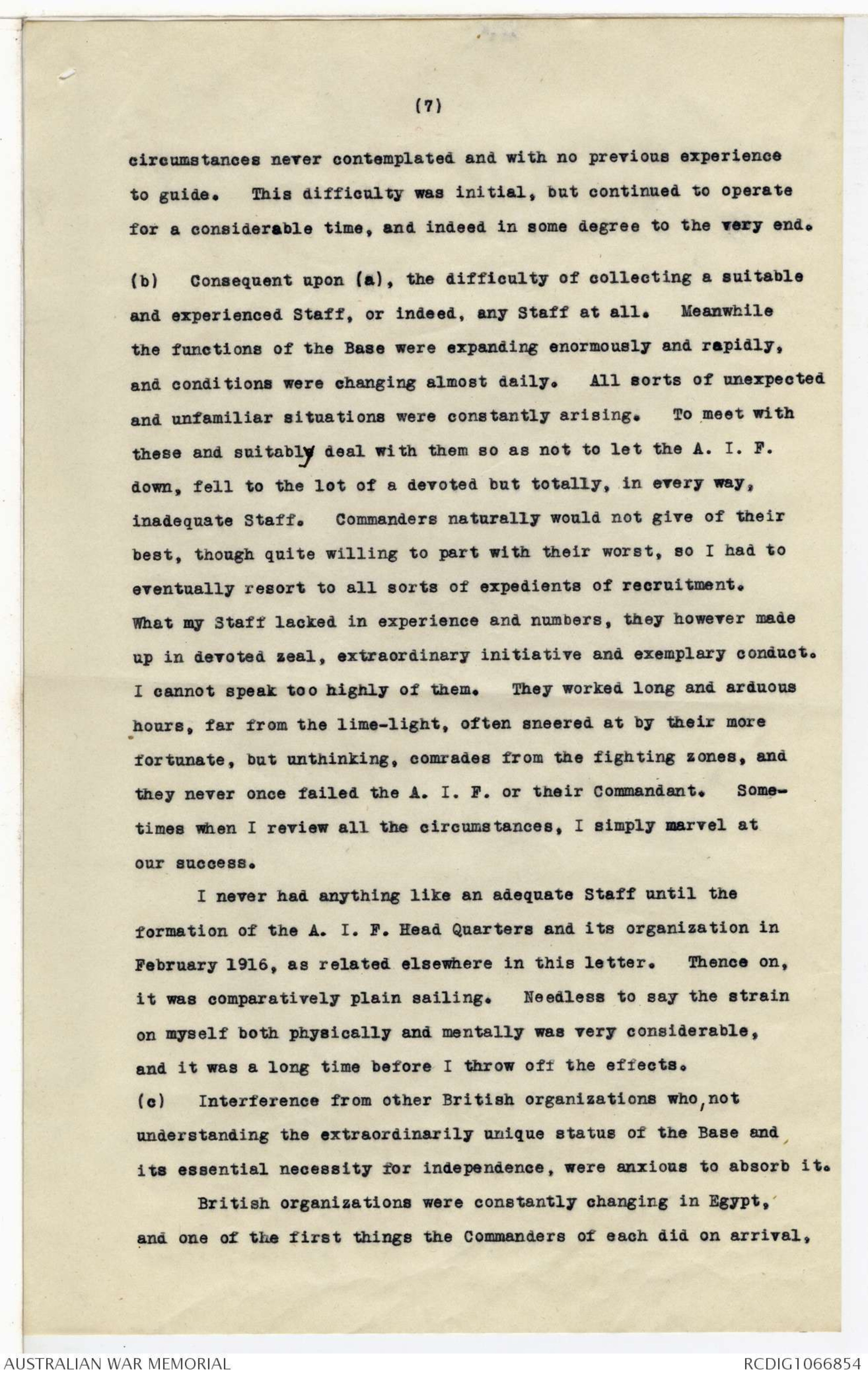
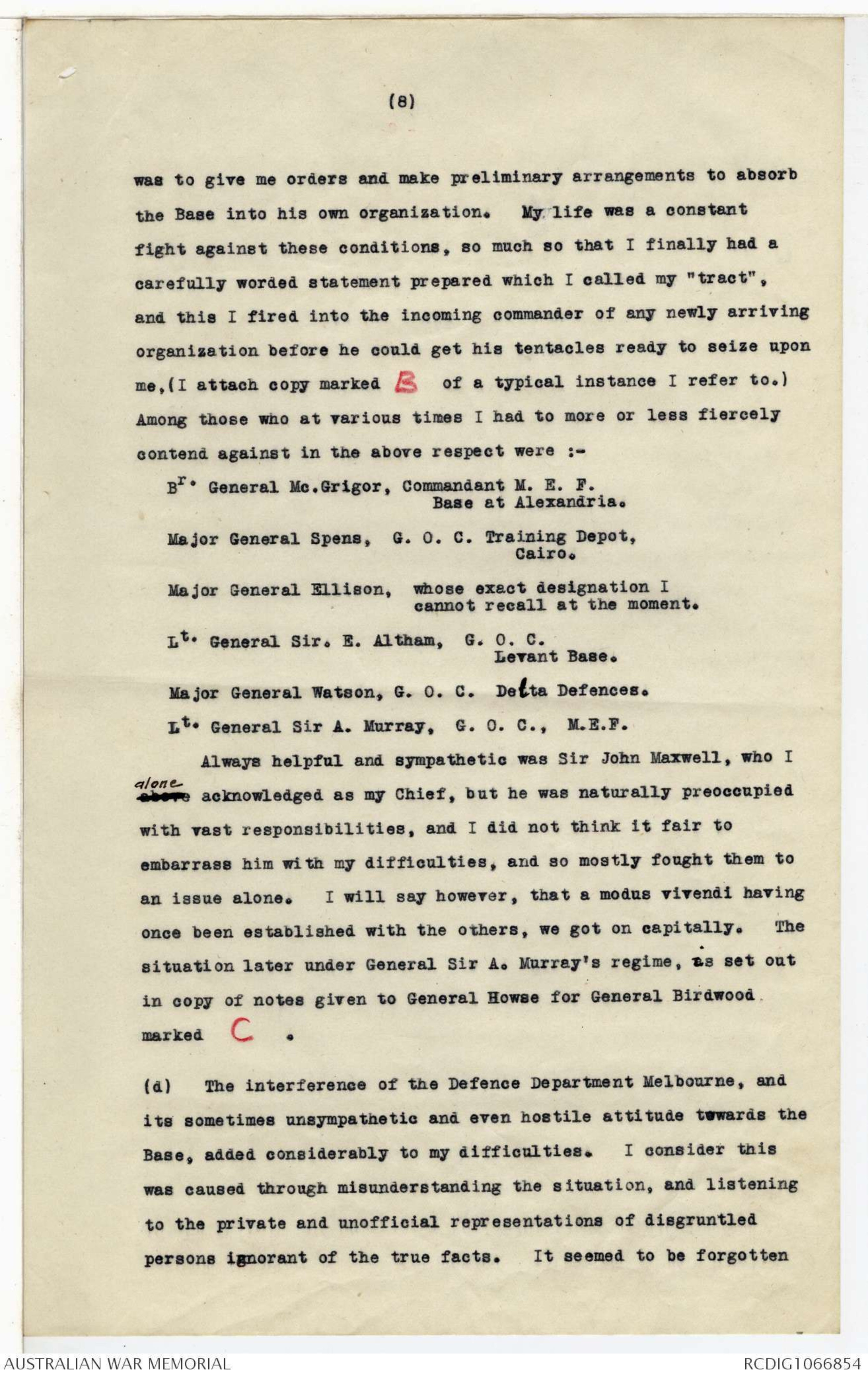
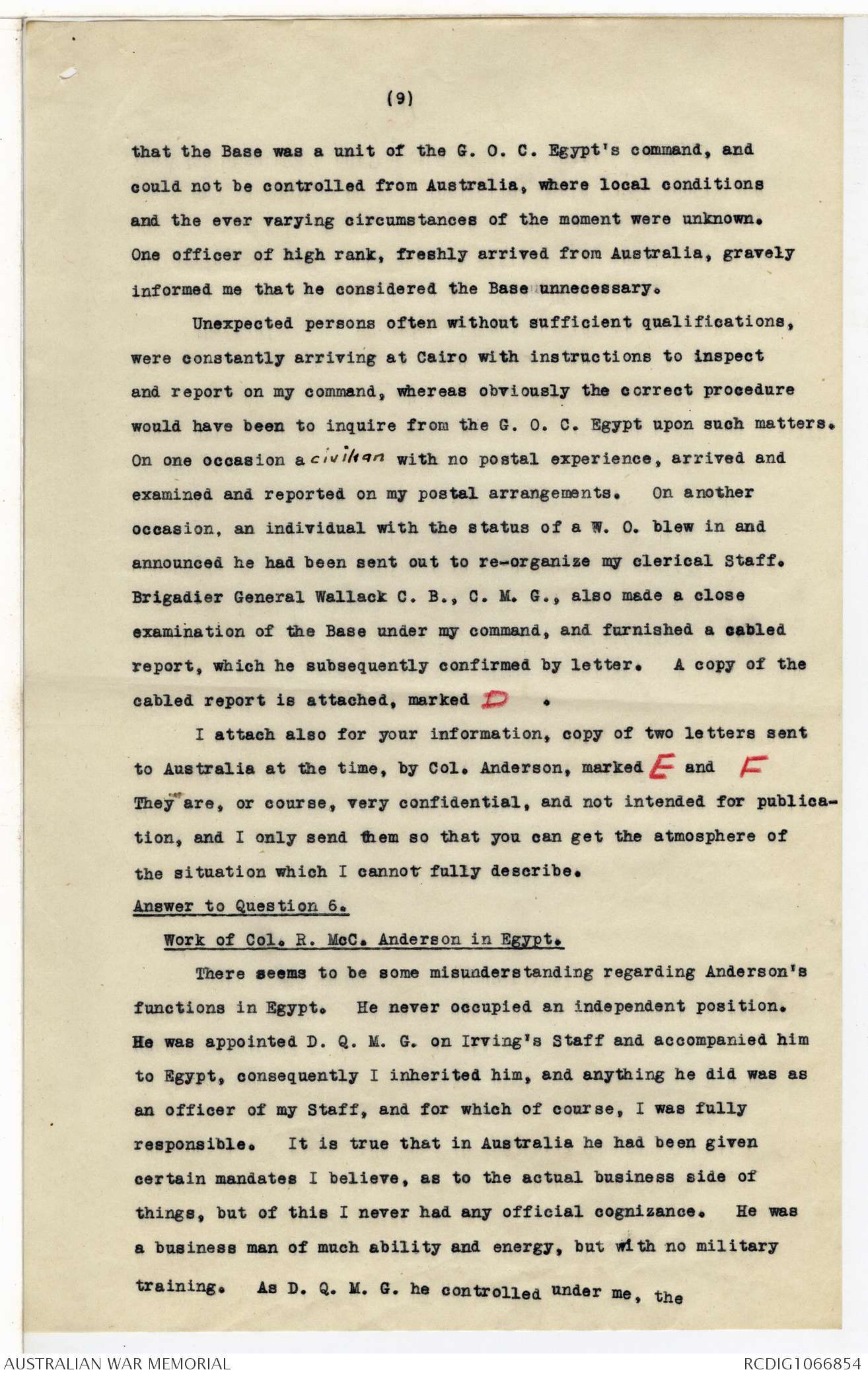
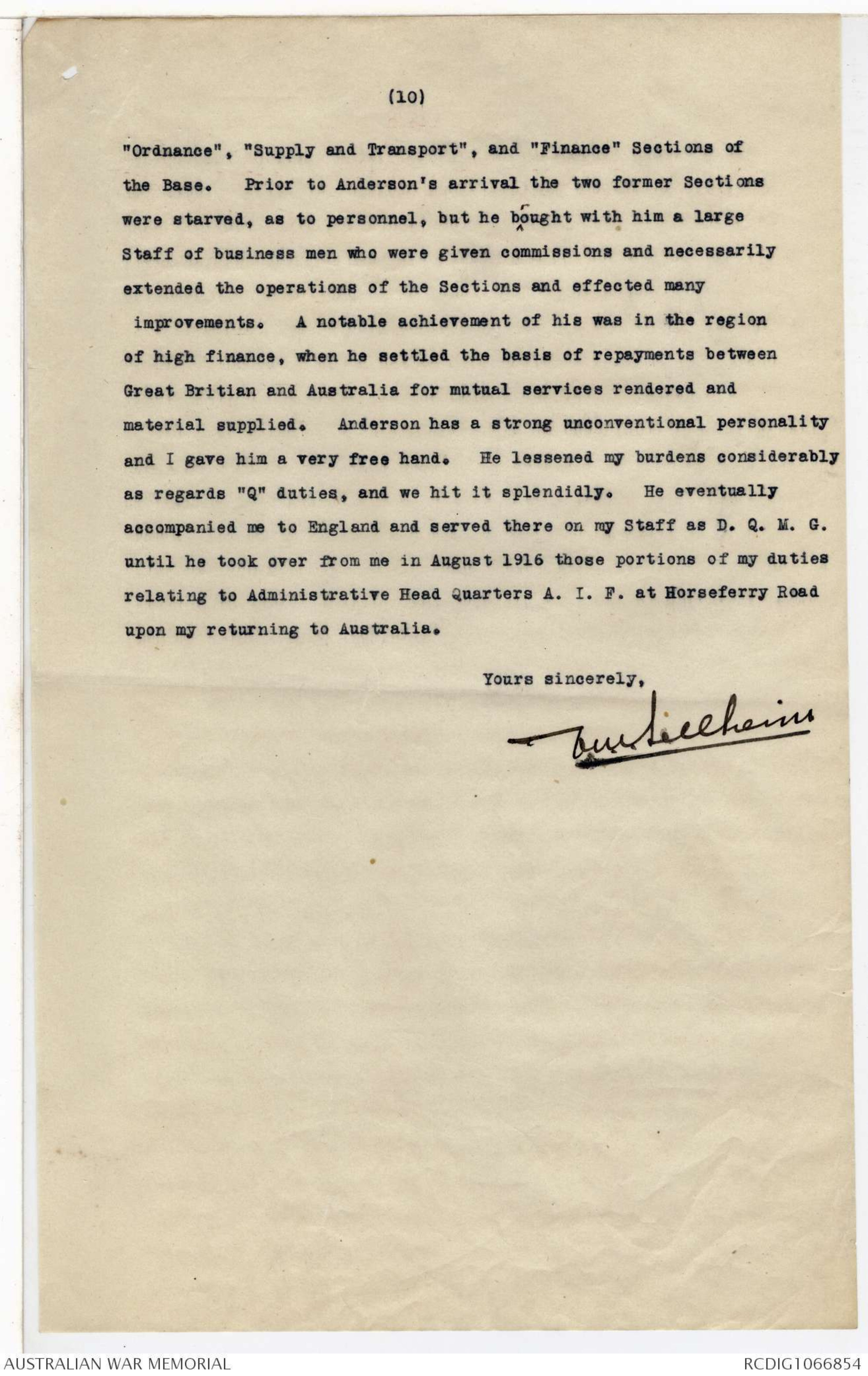
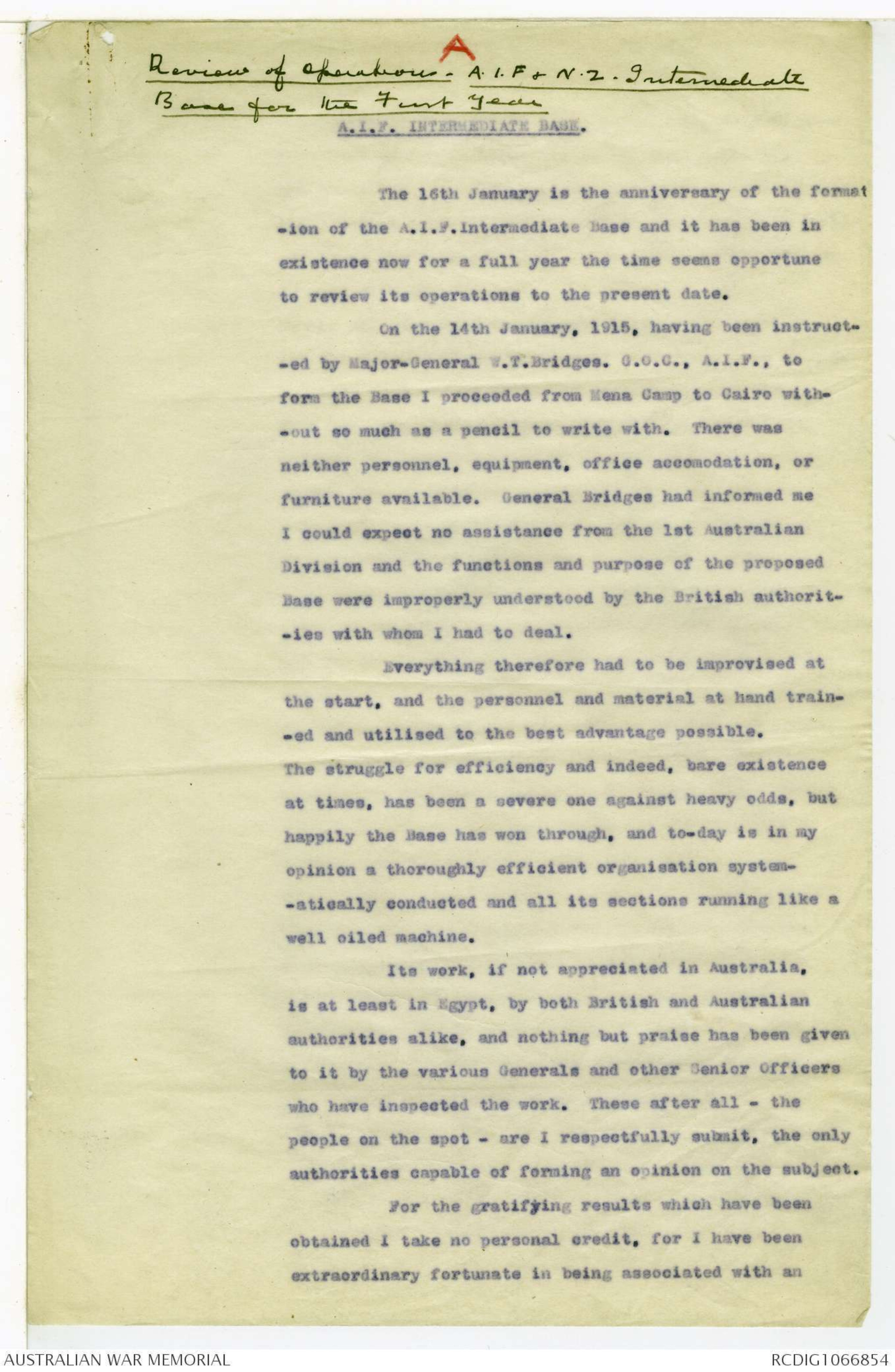
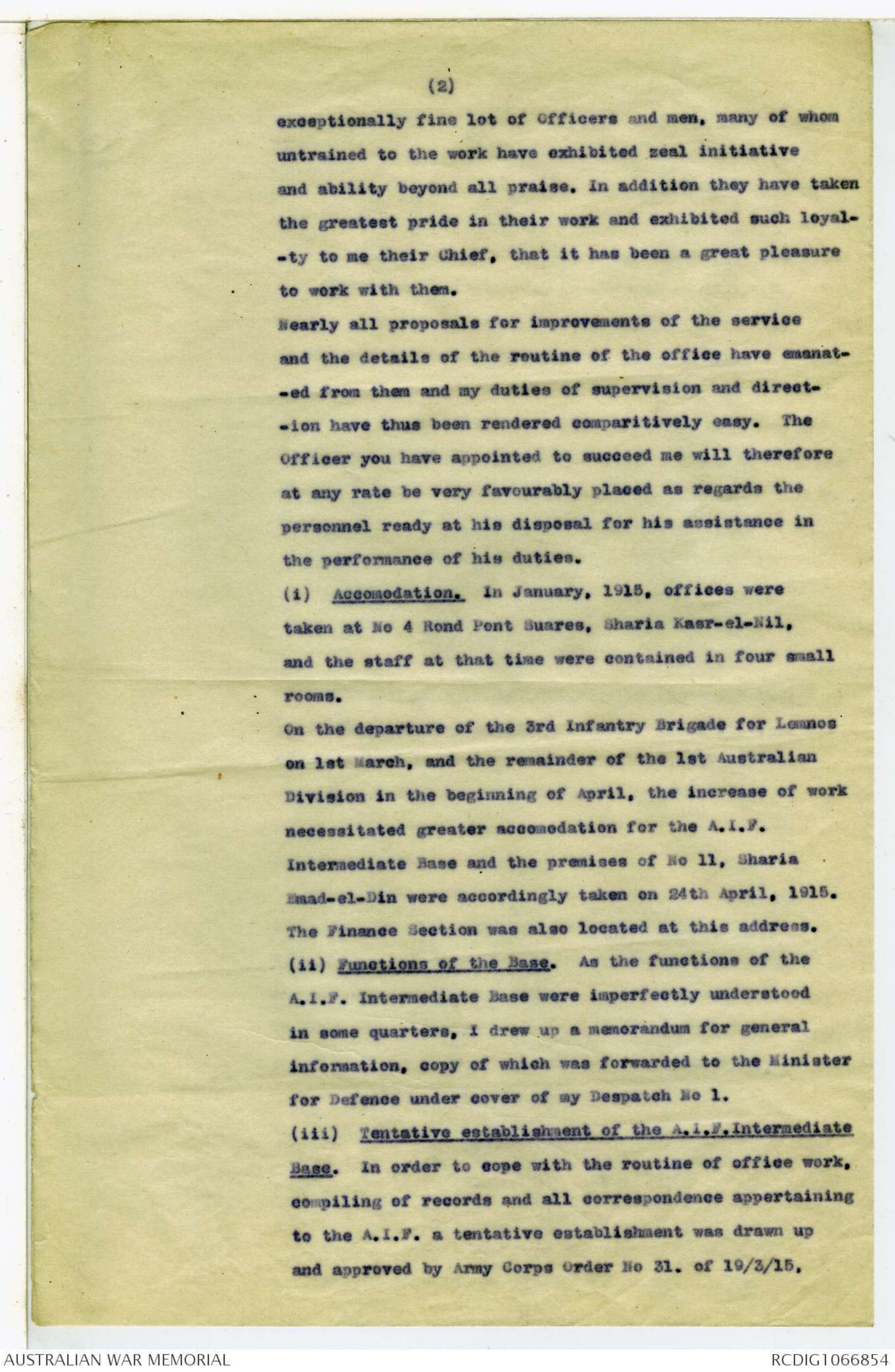
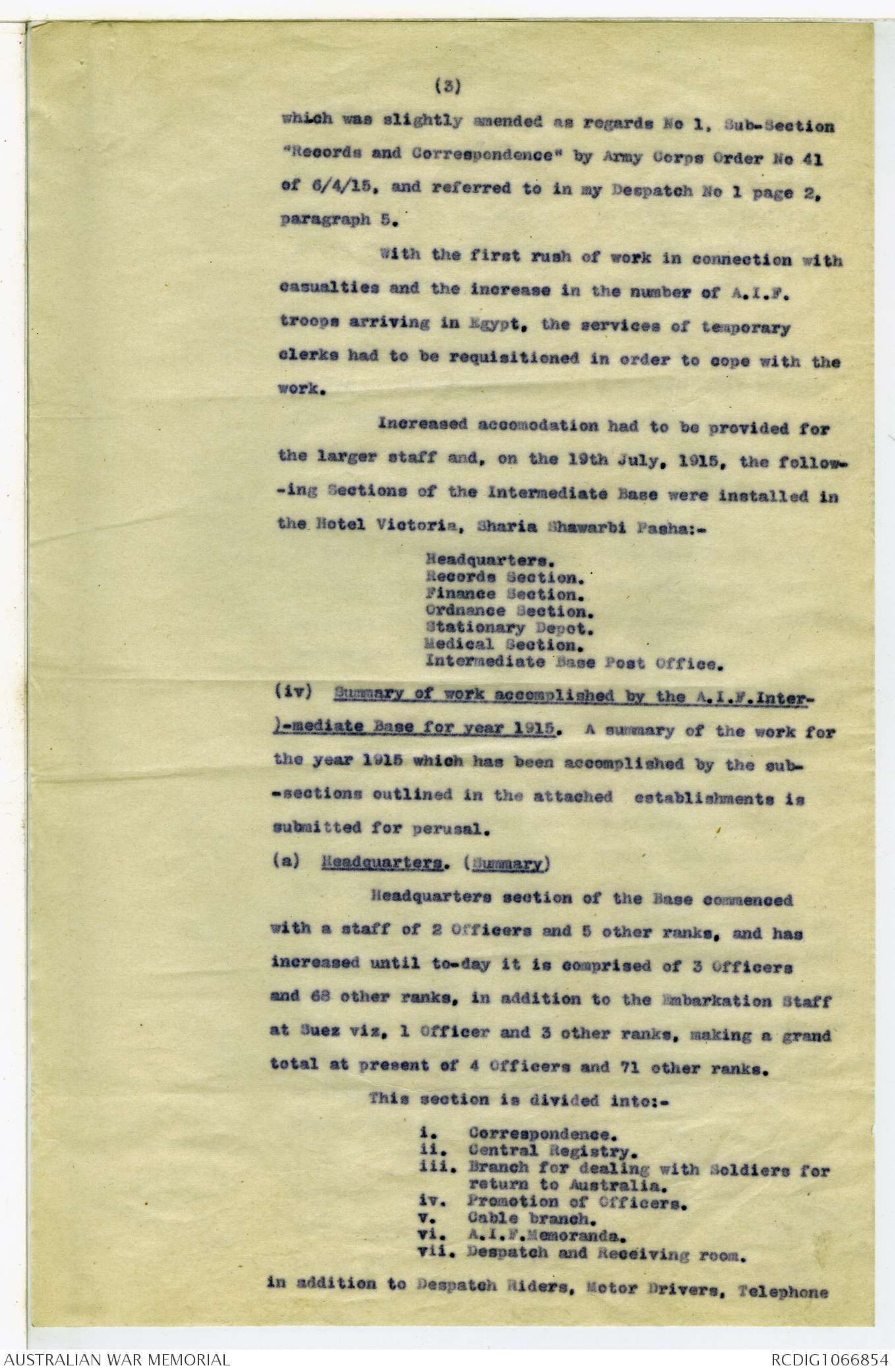
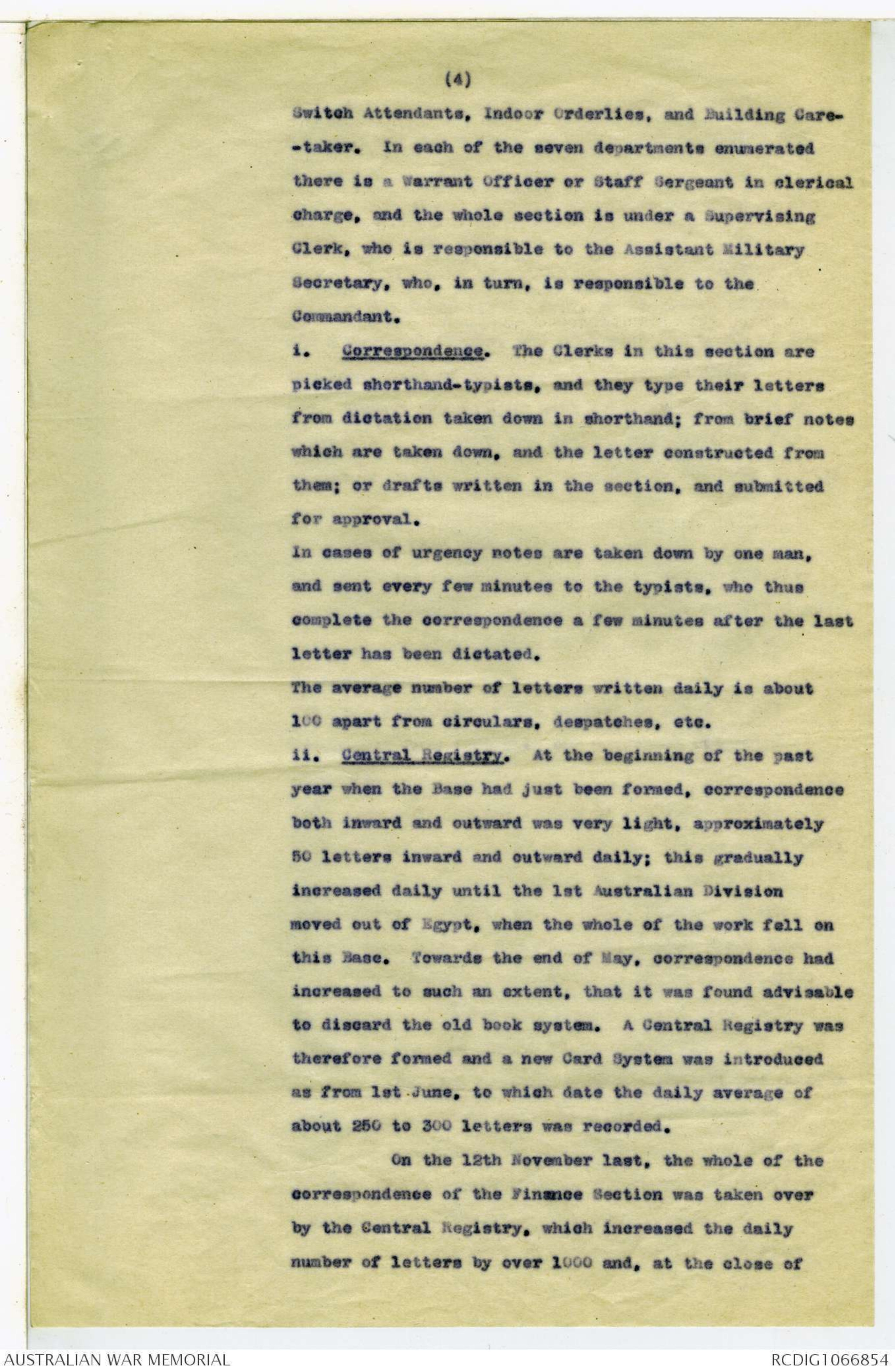
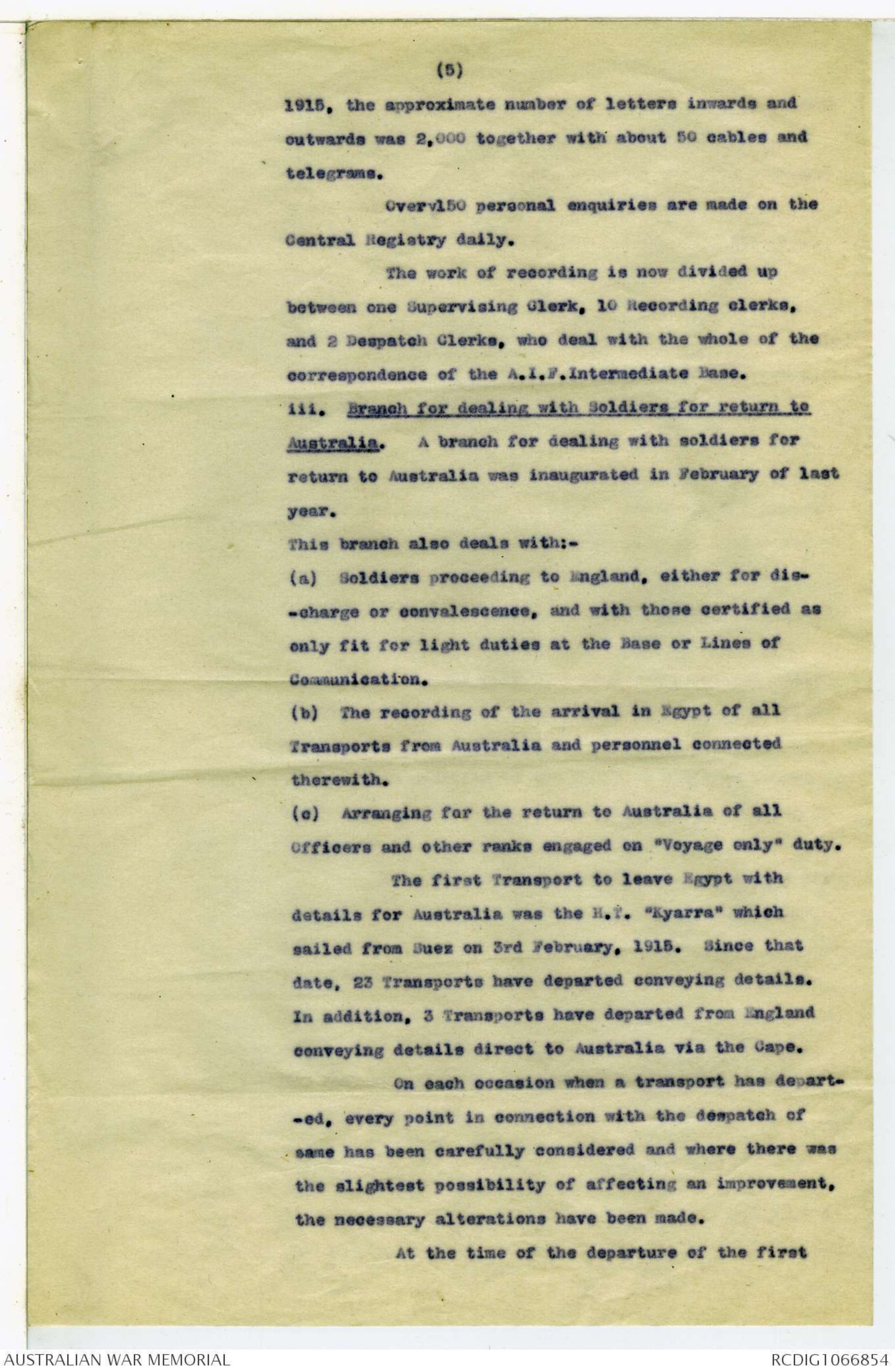
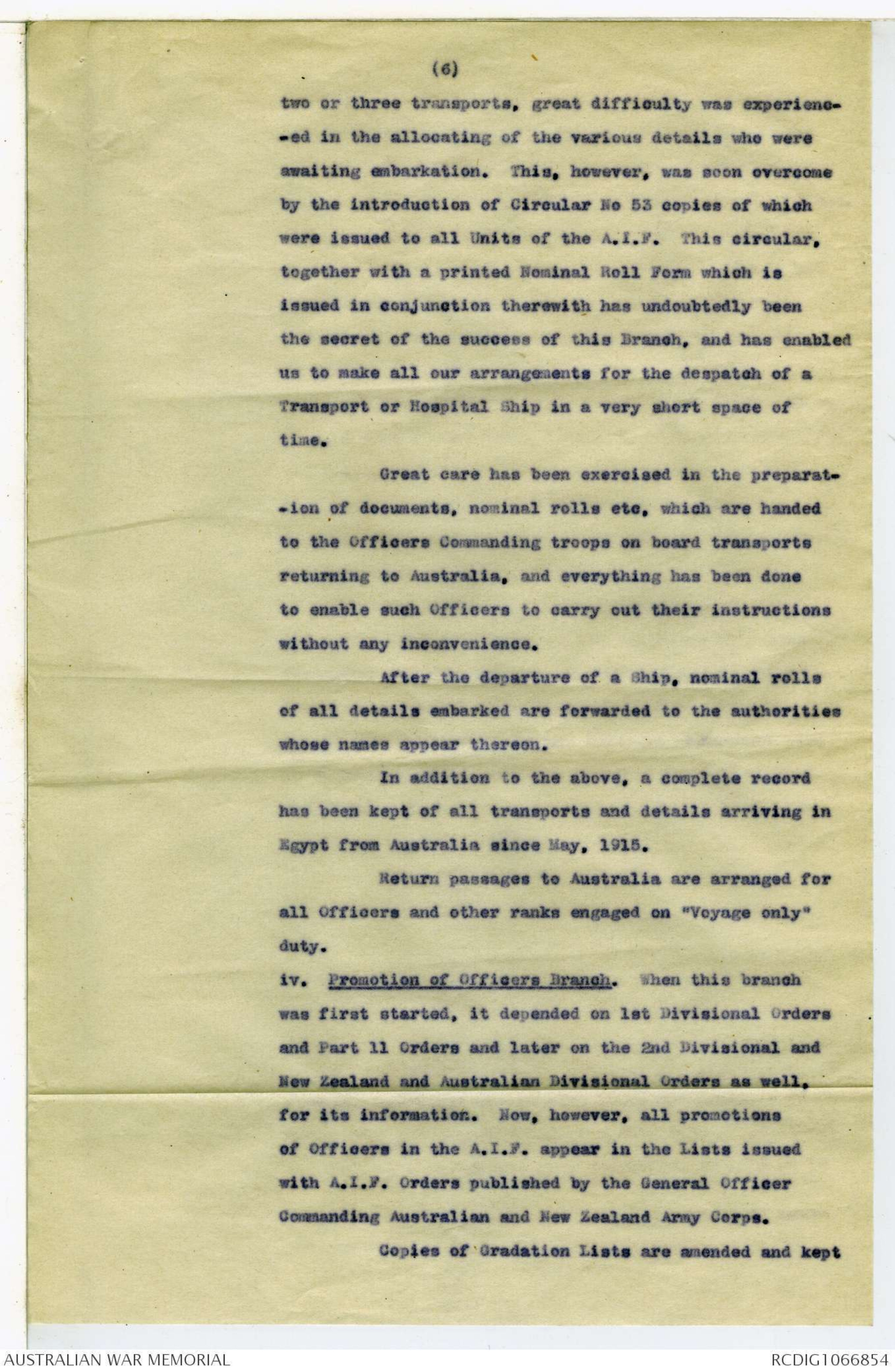
(7)
circumstances never contemplated and with no previous experience
to guide. This difficulty was initial, but continued to operate
for a considerable time, and indeed in some degree to the very end.
(b) Consequent upon (a), the difficulty of collecting a suitable
and experienced Staff, or indeed, any Staff at all. Meanwhile
the functions of the Base were expanding enormously and rapidly,
and conditions were changing almost daily. All sorts of unexpected
and unfamiliar situations were constantly arising. To meet with
these and suitably deal with them so as not to let the A. I. F.
down, fell to the lot of a devoted but totally, in every way,
inadequate Staff. Commanders naturally would not give of their
best, though quite willing to part with their worst, so I had to
eventually resort to all sorts of expedients of recruitment.
What my Staff lacked in experience and numbers, they however made
up in devoted zeal, extraordinary initiative and exemplary conduct
I cannot speak too highly of them. They worked long and arduous
hours, far from the lime-light, often sneered at by their more
fortunate, but unthinking, comrades from the fighting zones, and
they never once failed the A. I. F. or their Commandant. Sometimes
when I review all the circumstances, I simply marvel at
our success.
I never had anything like an adequate Staff until staff
formation of the A. I. F. Head Quarters and its organization in
February 1916, as related elsewhere in this letter. Thence on,
it was comparatively plain sailing. Needless to say the strain
on myself both physically and mentally was very considerable,
and it was a long time before I throw off the effects.
(c) Interference from other British organizations who, not
understanding the extraordinarily unique status of the Base and
its essential necessity for independence, were anxious to absorb it.
British organizations were constantly changing in Egypt,
and one of the first things the Commanders of each did on arrival,
(8)
was to give me orders and make preliminary arrangements to absorb
the Base into his own organization. My life was a constant
fight against these conditions, so much so that I finally had a
carefully worded statement prepared which I called my "tract",
and this I fired into the incoming commander of any newly arriving
organization before he could get his tentacles ready to seize upon
me, (I attach copy marked B of a typical instance I refer to.)
Among those who at various times I had to more or less fiercely
contend against in the above respect were :-
Br. General Mc.Grigor, Commandant M. E. F.
Base at Alexandria.
Major General Spens, G. O. C. Training Depot,
Cairo.
Major General Ellison, whose exact designation I
cannot recall at the moment.
Lt. General Sir. E. Altham, G. O. C.
Levant Base.
Major General Watson, G. O. C. Delta Defences.
Lt. General Sir A. Murray, G. O. C., M.E.F.
Always helpful and sympathetic was Sir John Maxwell, who Iabove alone acknowledged as my Chief, but he was naturally preoccupied
with vast responsibilities, and I did not think it fair to
embarrass him with my difficulties, and so mostly fought them to
an issue alone. I will say however, that a modus vivendi having
once been established with the others, we got on capitally. The
situation later under General Sir A. Murray's regime, as set out
in copy of notes given to General Howse for General Birdwood.
marked C.
(d) The interference of the Defence Department Melbourne, and
its sometimes unsympathetic and even hostile attitude towards the
Base, added considerably to my difficulties. I consider this
was caused through misunderstanding the situation, and listening
to the private and unofficial representations of disgruntled
persons ignorant of the true facts. It seemed to be forgotten
(9)
that the Base was a unit of the G. O. C. Egypt's command, and
could not be controlled from Australia, where local conditions
and the ever varying circumstances of the moment were unknown.
One officer of high rank, freshly arrived from Australia, gravely
informed me that he considered the Base unnecessary.
Unexpected persons often without sufficient qualifications,
were constantly arriving at Cairo with instructions to inspect
and report on my command, whereas obviously the correct procedure
would have been to inquire from the G. O. C. Egypt upon such matters.
On one occasion a civilian with no postal experience, arrived and
examined and reported on my postal arrangements. On another
occasion, an individual with the status of a W. O. blew in and
announced he had been sent out to re-organize my clerical Staff.
Brigadier General Wallack C. B., C. M. G., also made a close
examination of the Base under my command, and furnished a cabled
report, which he subsequently confirmed by letter. A copy of the
cabled report is attached, marked D.
I attach also for your information, copy of two letters sent
to Australia at the time, by Col. Anderson, marked E and F
They are, or course, very confidential, and not intended for publication,
and I only send them so that you can get the atmosphere of
the situation which I cannot fully describe.
Answer to Question 6.
Work of Col. R. McC. Anderson in Egypt.
There seems to be some misunderstanding regarding Anderson's
functions in Egypt. He never occupied an independent position.
He was appointed D. Q. M. G. on Irving's Staff and accompanied him
to Egypt, consequently I inherited him, and anything he did was as
an officer of my Staff, and for which of course, I was fully
responsible. It is true that in Australia he had been given
certain mandates I believe, as to the actual business side of
things, but of this I never had any official cognizance. He was
a business man of much ability and energy, but with no military
training. As D. Q. M. G. he controlled under me, the
(10)
"Ordnance", "Supply and Transport", and "Finance" Sections of
the Base. Prior to Anderson's arrival the two former Sections
were starved, as to personnel, but he brought with him a large
Staff of business men who were given commissions and necessarily
extended the operations of the Sections and effected many
improvements. A notable achievement of his was in the region
of high finance, when he settled the basis of repayments between
Great Britian and Australia for mutual services rendered and
material supplied. Anderson has a strong unconventional personality
and I gave him a very free hand. He lessened my burdens considerably
as regards "Q" duties, and we hit it splendidly. He eventually
accompanied me to England and served there on my Staff as D. Q. M. G.
until he took over from me in August 1916 those portions of my duties
relating to Administrative Head Quarters A. I. F. at Horseferry Road
upon my returning to Australia.
Yours sincerely,
V.C.M.Sellheim
A
Review of operations - A.I.F. & N.Z. Intermediate
B was for the First Year
A.I.F. INTERMEDIATE BASE.
The 16th January is the anniversary of the formation
of the A.l.F. Intermediate Base and it has been in
existence now for a full year the time seems opportune
to review its operations to the present date.
On the 14th January, 1915, having been instructed
by Major-General W.T. Bridges. G.O.C., A.I.F., to
form the Base I proceeded from Mena Camp to Cairo without
so much as a pencil to write with. There was
neither personnel, equipment, office accommodation, or
furniture available. General Bridges had informed me
I could expect no assistance from the 1st Australian
Division and the functions and purpose of the proposed
Base were improperly understood by the British authorities
with whom I had to deal.
Everything therefore had to be improvised at
the start, and the personnel and material at hand trained
and utilised to the best advantage possible.
The struggle for efficiency and indeed, bare existence
at times, has been a severe one against heavy odds, but
happily the Base has won through, and to-day is in my
opinion a thoroughly efficient organisation systematically
conducted and all its sections running like a
well oiled machine.
Its work, if not appreciated in Australia,
is at least in Egypt, by both British and Australian
authorities alike, and nothing but praise has been given
to it by the various Generals and other Senior Officers
who have inspected the work. These after all - the
people on the spot - are I respectfully submit, the only
authorities capable of forming an opinion on the subject.
for the gratifyng results which have been
obtained I take no personal credit, for I have been
extraordinary fortunate in being associated with an
(2)
exceptionally fine lot of Officers and men, many of whom
untrained to the work have exhibited zeal initiative
and ability beyond all praise. In addition they have taken
the greatest pride in their work and exhibited such loyalty
to me their Chief, that it has been a great pleasure
to work with them.
Nearly all proposals for improvements of the service
and the details of the routine of the office have emanated
from them and my duties of supervision and direction
have thus been rendered comparatively easy. The
Officer you have appointed to succeed me will therefore
at any rate be very favourably placed as regards the
personnel ready at his disposal for his assistance in
the performance of his duties.
(i) Accommodation. In January, 1915, offices were
taken at No 4 Rond Pont Suares, Sharis Kasr-el-Nil,
and the staff at that time were contained in four small
rooms.
On the departure of the 3rd Infantry Brigade for Lemnos
on 1st March, and the remainder of the 1st Australian
Division in the beginning of April, the increase of work
necessitated greater accommodation for the A.I.F.
Intermediate Base and the premises of No 11, Sharia
Emad-el-Din were accordingly taken on 24th April, 1915.
The Finance Section was also located at this address.
(ii) Functions of the Base. As the functions of the
A.I.F. Intermediate Base were imperfectly understood
in some quarters, I drew up a memorandum for general
information, copy of which was forwarded to the Minister
for Defence under cover of my Despatch No 1.
(iii) Tentative establishment of the A.1.F.Intermediate
Base. In order to cope with the routine of office work,
compiling of records and all correspondence appertaining
to the A.I.F. a tentative establishment was drawn up
and approved by Army Corps Order No 31. of 19/3/15,
(3)
which was slightly amended as regards No 1. Sub-Section
"Records and Correspondence" by Army Corps Order No 41
of 6/4/15, and referred to in my Despatch No 1 page 2,
paragraph 5.
With the first rush of work in connection with
casualties and the increase in the number of A.I.F.
troops arriving in Egypt, the services of temporary
clerks had to be requisitioned in order to cope with the
work.
Increased accommodation had to be provided for
the larger staff and, on the 19th July, 1915, the following
Sections of the Intermediate Base were installed in
the Hotel Victoria, Sharia Shawarbi Pasha:-
Headquarters.
Records Section.
Finance Section.
Ordnance Section.
Stationary Depot.
Medical Section.
Intermediate Base Post Office.
(iv) Summary of work accomplished by the A.I.F. Intermediate
Base for year 1915. A summary of the work for
the year 1915 which has been accomplished by the sub-sections
outlined in the attached establishments is
submitted for perusal.
(a) Headquarters. (Summary)
Headquarters section of the Base commenced
with a staff of 2 Officers and 5 other ranks, and has
increased until to-day it is comprised of 3 Officers
and 68 other ranks, in addition to the Embarkation Staff
at Suez viz, 1 Officer and 3 other ranks, making a grand
total at present of 4 Officers and 71 other ranks.
This section is divided into:-
i. Correspondence
ii. Central Registry.
iii. Branch for dealing with Soldiers for
return to Australia.
iv. Promotion of Officers.
v. Cable branch.
vi. A.I.F. Memoranda.
vii. Despatch and Receiving room.
in addition to Despatch Riders, Motor Drivers, Telephone
(4)
Switch Attendants, Indoor Orderlies, and Building Caretaker.
In each of the seven departments enumerated
there is a Warrant Officer or Staff Sergeant in clerical
charge, and the whole section is under a Supervising
Clerk, who is responsible to the Assistant Military
Secretary, who, in turn, is responsible to the
Commandant.
i. Correspondence. The Clerks in this section are
picked shorthand-typists, and they type their letters
from dictation taken down in shorthand; from brief notes
which are taken down, and the letter constructed from
them; or drafts written in the section, and submitted
for approval.
In cases of urgency notes are taken down by one man,
and sent every few minutes to the typists, who thus
complete the correspondence a few minutes after the last
letter has been dictated.
The average number of letters written daily is about
100 apart from circulars, despatches, etc.
ii. Central Registry. At the beginning of the past
year when the Base had just been formed, correspondence
both inward and outward was very light, approximately
50 letters inward and outward daily; this gradually
increased daily until the 1st Australian Division
moved out of Egypt, when the whole of the work fell on
this Base. Towards the end of May, correspondence had
increased to such an extent, that it was found advisable
to discard the old book system. A Central Registry was
therefore formed and a new Card System was introduced
as from 1st June, to which date the daily average of
about 250 to 300 letters was recorded.
On the 12th November last, the whole of the
correspondence of the Finance Section was taken over
by the Central Registry, which increased the daily
number of letters by over 1000 and, at the close of
(5)
1915, the approximate number of letters inwards and
outwards was 2,000 together with about 50 cables and
telegrams.
Overv150 personal enquiries are made on the
Central Registry daily.
The work of recording is now divided up
between one Supervising Clerk, 10 Recording clerks,
and 2 Despatch Clerks, who deal with the whole of the
correspondence of the A.l.F. Intermediate Base.
iii. Branch for dealing with Soldiers for return to
Australia. A branch for dealing with soldiers for
return to Australia was inaugurated in February of last
year.
This branch also deals with:-
(a) Soldiers proceeding to England, either for discharge
or convalescence, and with those certified as
only fit for light duties at the Base or Lines of
Communication.
(b) The recording of the arrival in Egypt of all
Transports from Australia and personnel connected
therewith.
(c) Arranging for the return to Australia of all
Officers and other ranks engaged on "Voyage only" duty.
The first Transport to leave Egypt with
details for Australia was the H.T. "Kyarra" which
sailed from Suez on 3rd February, 1915. Since that
date, 23 Transports have departed conveying details.
In addition, 3 Transports have departed from England
conveying details direct to Australia via the Cape.
On each occasion when a transport has departed,
every point in connection with the despatch of
same has been carefully considered and where there was
the slightest possibility of affecting an improvement,
the necessary alterations have been made.
At the time of the departure of the first
(6)
two or three transports, great difficulty was experienced
in the allocating of the various details who were
awaiting embarkation. This, however, was soon overcome
by the introduction of Circular No 53 copies of which
were issued to all Units of the A.l.F. This circular,
together with a printed Nominal Roll Form which is
issued in conjunction therewith has undoubtedly been
the secret of the success of this Branch, and has enabled
us to make all our arrangements for the despatch of a
Transport or Hospital Ship in a very short space of
time.
Great care has been exercised in the preparation
of documents, nominal rolls etc, which are handed
to the Officers Commanding troops on board transports
returning to Australia, and everything has been done
to enable such Officers to carry out their instructions
without any inconvenience.
After the departure of a Ship, nominal rolls
of all details embarked are forwarded to the authorities
whose names appear thereon.
In addition to the above, a complete record
has been kept of all transports and details arriving in
Egypt from Australia since May, 1915.
Return passages to Australia are arranged for
all Officers and other ranks engaged on "Voyage only'
duty.
iv. Promotion of officers Branch. When this branch
was first started, it depended on 1st Divisional Orders
and Part 11 Orders and later on the 2nd Divisional and
New Zealand and Australian Divisional Orders as well.
for its information. Now, however, all promotions
of Officers in the A.I.F. appear in the Lists issued
with A.I.F. Orders published by the General Officer
Commanding Australian and New Zealand Army Corps.
Copies of Gradation Lists are amended and kept
 Sam scott
Sam scottThis transcription item is now locked to you for editing. To release the lock either Save your changes or Cancel.
This lock will be automatically released after 60 minutes of inactivity.